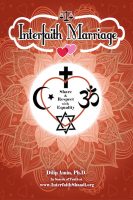At least in public, most people claim to be tolerant of others. This article was written as a rebuttal to a question raised at Patheos and covers who is tolerant and who is not.
Tathagata Roy had serious objections to painting Muslims, Christians and Jews with the same coarse brush called “Abrahamic.” These three traditions are very different in some ways; for example: Jews do not proselytize, whereas Christians and Muslims do. Then again, Christians in present time do it by persuasion, while extreme Islamists may do it by force. Thus, he (Roy) implied that these three are very different.
Someone could counter this argument by saying that these three Abrahamic traditions are more or less the same. All three are monotheist, exclusivist and supremacist faiths. All three believe that salvation is possible only through their version of faith or that they are the “chosen” people. All three believe in their own version of God and have not accepted each other’s vision of God. Further, all three believe that Hindus are “idol worshipers” and, two of these traditions believe that on the Judgment Day, the idol worshipers will get the “Hell of Fire” while they will be “saved.” All three traditions have based their scriptures on some variations of the Second of the Ten Commandments that are supposed to be the stern injunctions from their God.
Being raised as a Hindu, the author was taught “Ishvara Allah tero nam” (both Ishvara and Allah are equally valid names of One God). Further, all those who have good karma will achieve moksha (salvation), regardless of which path they follow. It is your karma, not the specific religion, or name of God, that is important. Hindu Dharma teaches that there is only One Absolute Supreme power and thus it is a truly monotheistic religion. But Hindu Dharma allows abundant freedom of expression for the forms of God; therefore Hindus in general, have no problem with someone praying to God in the name of Buddha, Jesus or Allah.
As a child, the author was never confused by this all inclusive, pluralistic view. In contrast, leaders of all three Abrahamic monotheist religions believe that a child will get confused with teachings of two different faiths; therefore, parents in an interfaith marriage must pick one of the two faiths for their children. , , Religious fanatics of all faiths argue that a child cannot be raised in two faiths. If so, then whose god will win? Followers of all three Abrahamic faiths usually expect a Hindu spouse and/or their children to undergo baptism, bris or shahadah/sunat to publicly announce that their God will rule in their married life.
Jews may not proselytize but they consider interfaith marriages a “Silent Holocaust.” In a Hindu-Jew marriage, the Jewish partner may do anything possible, including giving “conditional” love, to have their children go through the bris ceremony and raise them in the Jewish faith only. To a Hindu spouse and their children in an interfaith marriage, does it matter what method—force, persuasion or conditional love—is used when the ultimate result is the same: baptism, bris or shahadah/sunat?
As Lisa Miller (writer and journalist) has explained, a Hindu believes there are many paths to God. Jesus is one way, the Qur’an is another, and yoga practice is a third. None is better than any other; all are equal. Most traditional, conservative Christians have not been taught to think like this. They learn in Sunday school that their religion is true, and others are false. Jesus said (John 14:6), “I am the way, the truth, and the life. No one comes to the Father (God) except through me.”
Fortunately, these days, most Abrahamics are no longer exclusivists and are happily tolerating spouses from other faiths in their married life. According to a 2008 Pew Forum survey, 65 percent of Americans believe that “many religions can lead to eternal life”—including 37 percent of white evangelicals, the group most likely to believe that salvation is theirs alone. As Lisa Miller has further stated, conceptually at least, we are slowly becoming more like Hindus and less like traditional Christians in the ways we think about God, ourselves, each other, and eternity. Stephen Prothero, religion professor at Boston University, has long framed the American propensity for “the divine-deli-cafeteria religion” as “very much in the spirit of Hinduism. You are not picking and choosing from different religions, because they’re all the same.”
Are all religions the same? It depends. Religious scripture may say one thing but an individual may interpret it differently based on current understanding of their scriptures. In reality, for an interfaith couple, it is not the spouse’s scriptures but an individual’s personal faith and beliefs that count. If so, then there are only two types of Abrahamics, and for that matter Hindus too: those that are tolerant and respect others the way they are, and those that are intolerant and wish to transform their spouse (and children) from other faiths to acquiesce to their intolerant view of the world.
 A Chapter from the book Interfaith Marriages: Share and Respect with Equality is posted here. View some of others chapters from the book here.
A Chapter from the book Interfaith Marriages: Share and Respect with Equality is posted here. View some of others chapters from the book here.
Video messages by the author
How to purchase the book (as low as Rs.270 or $14.99).
Return to Home, Blogs, How to Share? Facebook, Youtube, Twitter, Book, Media.

